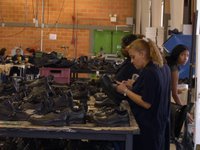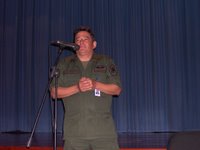Day One: Report from Venezuela



January 11, 2006
When Hugo Chavez took office the price of oil plunged as low as $7 per barrel. Now – thanks in part to the Iraq War – oil is reliably selling in excess of $50 per barrel. The Iraq War, which Chavez opposes, is providing oil rich Venezuela with billions in extra cash to help his country finance an ambitious program whose aims include narrowing the gap between its rich and poor, and intensifying economic and diplomatic ties between Venezuela and other nations in the region. It’s a program the Bush administration scorns. Whether Chavez can transform Venezuelan society with this paradoxical oil dividend is the $5 billion question confronting this country.
***
CIP’s Venezuela delegation spent its first day in Caracas examining some of the fundamental challenges facing President Hugo Chavez’s government.
Can it build a more equitable and inclusive society by plunging oil profits into social projects such as providing literacy and health care to the nation’s poor?
Can a nation that has historically generated wealth from natural resources –hydrocarbons – successfully diversify its economy? Can any nation do so, particularly absent protections for other industries that must compete in a global economy?
Can the Chavez presidential office and the state oil company, PDVSA, successfully manage an array of social programs while bypassing the ministries in Venezuela’s government that have traditionally run such programs – ministries viewed by Chavez supporters as obstacles to reform and staffed by some who oppose Chavez’s program?
What are the human rights conditions in the country, and can human rights advocates meaningfully shape the state’s policy toward protecting political rights?
***
When it comes to oil and social programs, Venezuela just does things differently, differently at least from the ways we in the United States are accustomed. The oil company is state-owned, and the Venezuelan government is merging the missions of the oil company and the state energy agency which sets policy. Venezuela is using its rising oil profits to fund social programs – PDVSA is doing things Exxon-Mobil wouldn’t be caught dead doing. A military officer, Col. Dester Rodriguez, is administering the overall program using oil profits for social ends.
The delegation heard from Col. Rodriguez this morning, and he talked a great deal about the theory behind the program and its historic background. The delegation had more specific questions than the Colonel was willing, or able, to answer. But he did make an awfully strong case that PDVSA was responsible for sparks of social change that the Chavez government means to transform Venezuelan society.
The public clearly thinks so too. As our delegation arrived at the PDVSA building, a small and respectful demonstration was taking place outside its chained gates – parents and protestors praising Chavez for his social missions, but blaming the oil company for not fulfilling the government’s promises to help the nation’s children.
Blaming the oil company. Perhaps not that different from the United States after all.
***
Unlike the human rights abuses that CIP has investigated in the past – brutality against citizens for expressing their political views, using violence and illegal measures to stifle political change – we learned today that the NGOs here are focused on something else. Human rights abuses are aimed at the poor, committed by the police, and are measures to repress the poor as a form of social control. These NGOs help the victims, when their families report incidents of abuse and violence against them. They work with the police to professionalize their activities through education. And they have worked with the government to change the constitution and Venezuelan law, to try and provide a better legal framework for protecting the victims of abuse.
The NGOs have historically worked on 100-150 such cases per year. They recently scored a victory when the Venezuelan Attorney-General made the remarkable disclosure that the government believes that 6,000 cases of abuse had occurred in the last five years, a multiple of what the NGOs themselves recorded. Their on-going mission is dealing with the activities of local police forces which are responsible for the human rights violations committed against Venezuelan citizens.
***
There’s a center in Caracas near some of its desperate barrios, precariously perched on the city’s hillsides, where the Chavez social missions employ poor Venezuelans, and give them access to health care, education, and better lives. We visited this center, named for a Venezuelan patriot, Fabricio Ojeda, and saw the words expressed this morning by Col. Rodriguez at PDVSA turned into actions.
There’s a shoe factory on the site that employs 144 locals, largely women, that is currently filling an order for 20,000 pairs of shoes destined for Cuba. The shoes – we say with admiration – looked like Venezuela’s version of “Doc Marten’s”. The workers earn money based on their productivity, and they were hard at work on stitching machines and other equipment in a relatively quiet and completely clean factory.
We also looked in on the health clinic, where teams of twenty doctors working in shifts, have seen an astounding 64,000 patients in the eleven months it has been open. The clinic provides care to people with illnesses first diagnosed in barrio clinics. It also has care for dental patients, women expecting children, internal medicine, and other specialties. Reforming health care is a high priority for the Chavez government; it has sent 9,000 low-income Venezuelan students to study in Cuban medical schools, and is building new medical schools in Venezuela to produce more doctors for its people.
***
One member of the delegation said, “The money really is getting to the people.” He said this outside the clinic, as we watched a mixed group of Venezuelan kids working moves on a basketball court, built to sturdy American-style standards, near the clinic, and next to an equally impressive soccer field. It’s impossible to measure on the first day of a tour, but what we saw did provide some measure of hope.
At the same time, Venezuela clearly has a distance to go. Not long before we arrived, a bridge nearly buckled on the road which takes the majority of the traffic from Caracas’s new international airport into the nation’s capital. Cars are now barred from traversing this highway, and there appears that there may be no solution to the problem until 2007. Meanwhile, traffic is tied up on two alternative routes; commercial trucks have to wait until after 9pm to travel into Caracas and back to the airport and port, just to keep the city supplied. Tourists coming into the country at night have to navigate drives around bending mountain roads that can last 4 hours. It used to take 25 minutes to get into the city. Alarms have been raised about the bridge for more than twenty years.
***
The delegation continues its work tomorrow. And we’ll file another report –with photos of course – before the sun goes down somewhere in the USA. Until then, that’s Caracas Connect connecting from Caracas.

0 Comments:
Post a Comment
<< Home